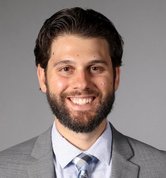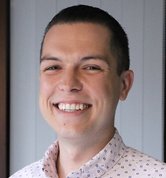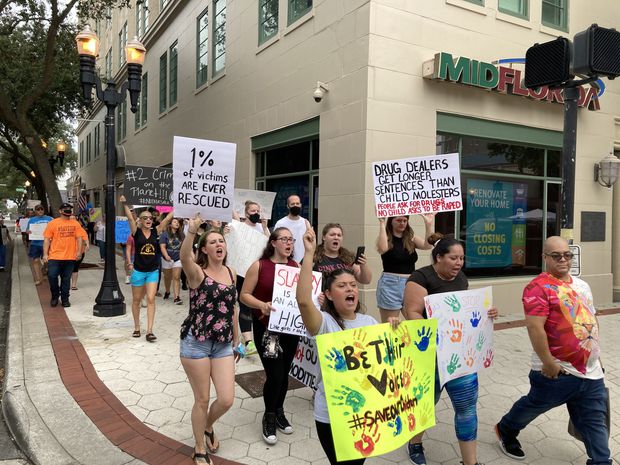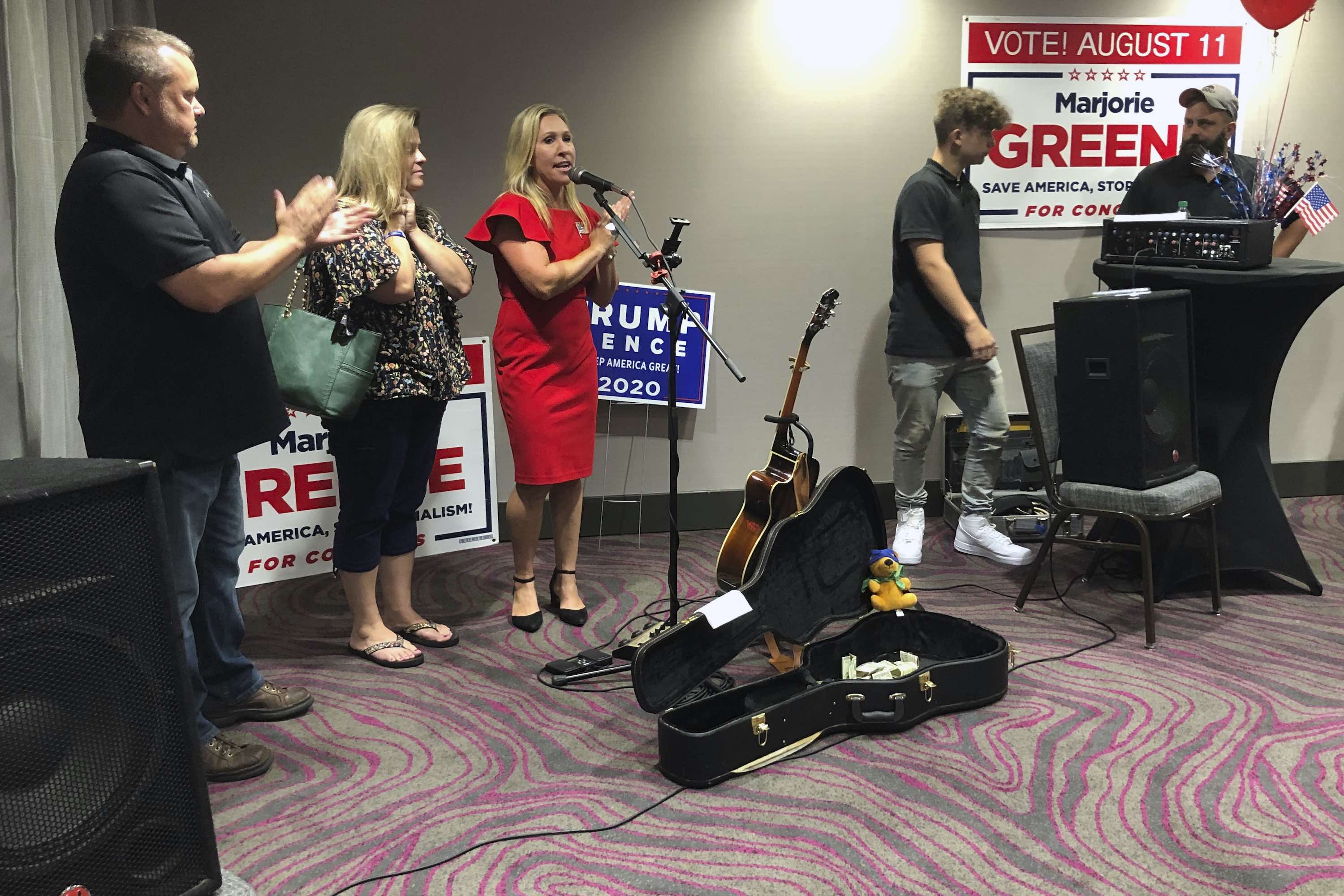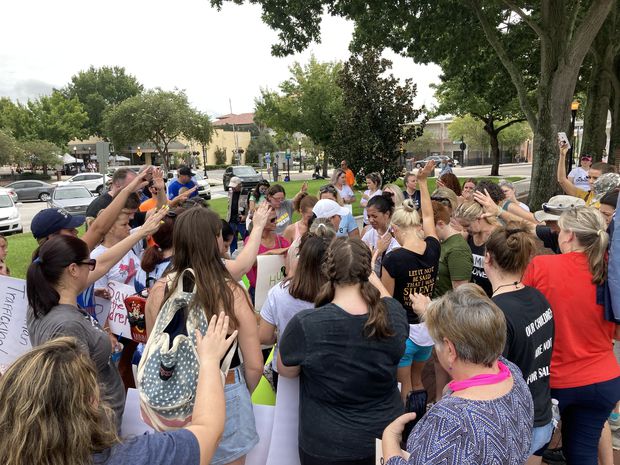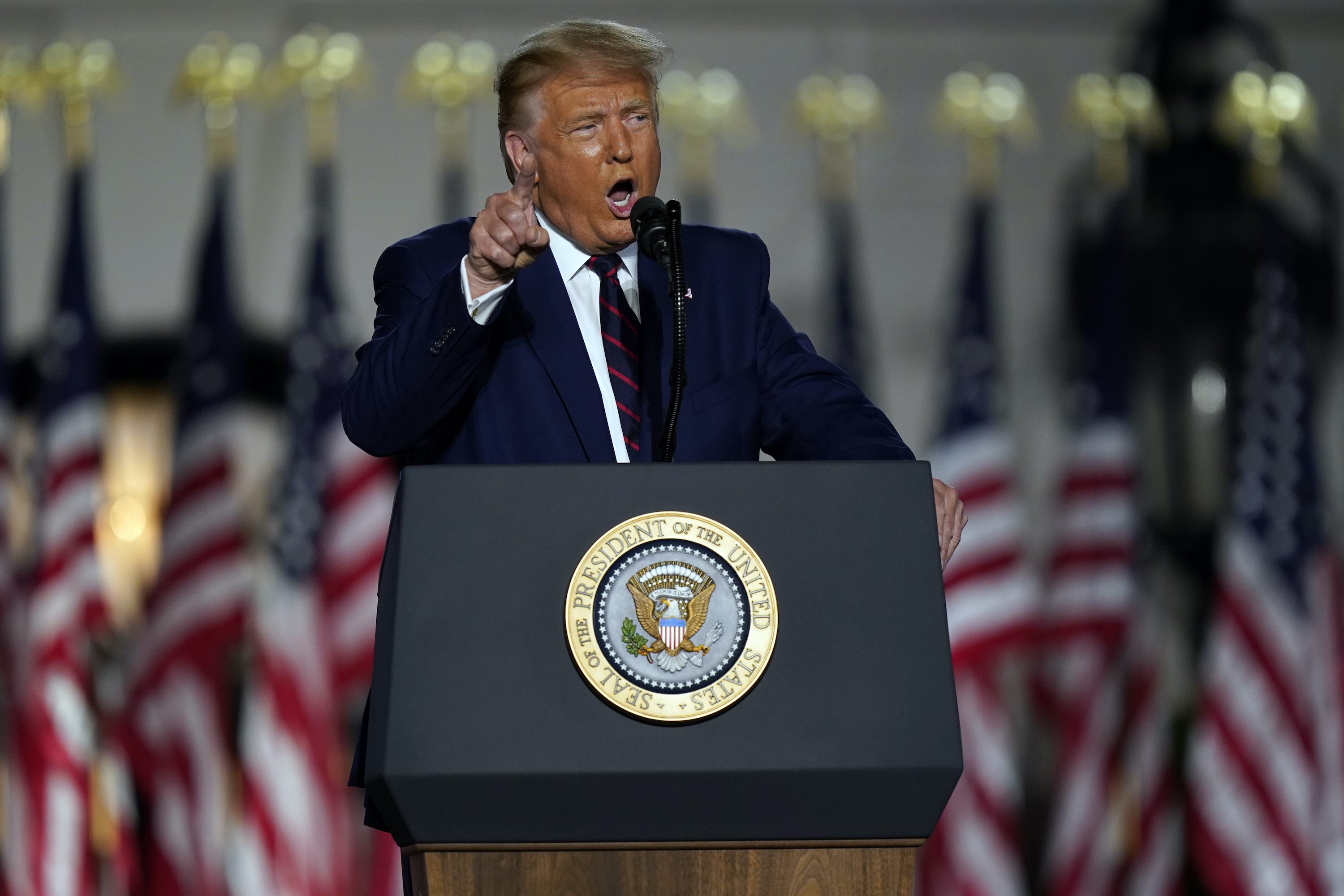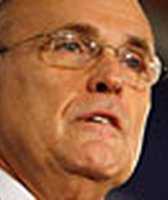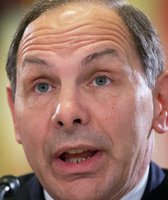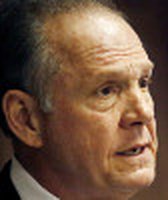Stand up for the facts!
Our only agenda is to publish the truth so you can be an informed participant in democracy.
We need your help.
I would like to contribute
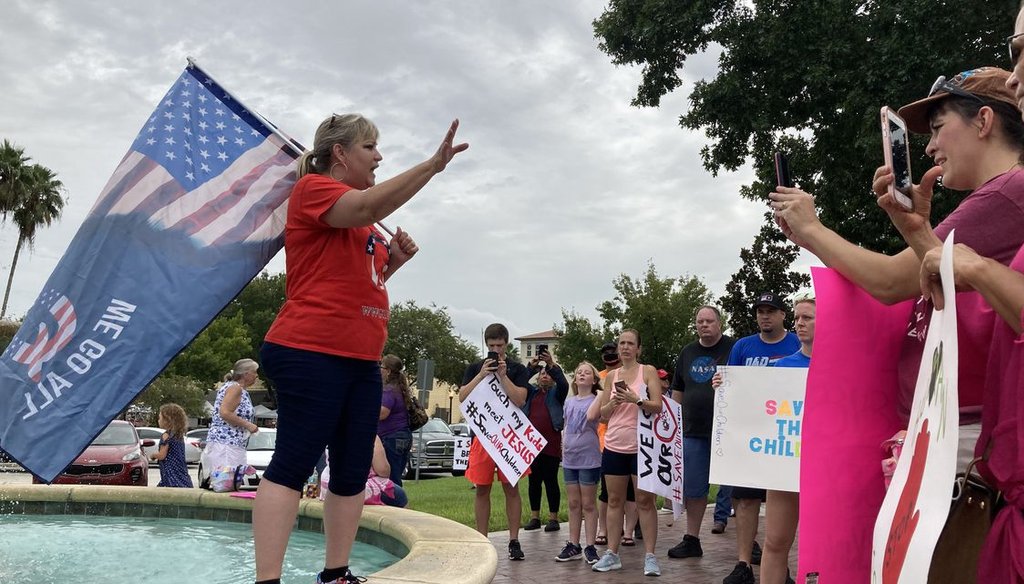
Suzanne Carter addresses a protest against child trafficking in Munn Park of downtown Lakeland, Fla., on Aug. 22, 2020. (Steve Contorno)
LAKELAND, Fla. — The mid-morning wave of farmer’s market shoppers picked through amateur art and leafy greens until their gaze caught a group forming around the downtown park.
The swelling crowd — a train of strollers, flip flops and jean shorts, packs of 20-something-year-olds and kids with weekend energy — would have blended with everyone else hunting for local honey and iced coffee, except they carried neon and white poster boards with handwritten messages they hoped the world would see.
They shouted phrases like, "Our children are not for sale," or the more aggressive, "Don’t touch our f---king kids." One sign showed a "no" symbol over an illustration of a pizza slice.
At a nearby booth, a seller quipped to a woman walking toward the pack: "If they’re protesting, they’ll have to talk to me so I know if I’m for them or against them."
"You’d be for this one," she responded. "It’s to fight human trafficking."
Demonstrators in Lakeland and about 200 other American cities marched Aug. 22 to raise awareness for the thousands of children who go missing each year. At least that’s how it appeared.
Behind this display of nationwide outrage lurked followers of QAnon, an anonymous internet persona who since 2017 has claimed to be a government insider with information on a "deep state" plot to work against President Donald Trump. QAnon asserts, with baseless or intentionally vague evidence, that certain celebrities, politicians and other public figures are Satan-worshipping, cannibalistic pedophiles. Trump, Q says, was put in place to stop them.
These conspiracy theorists have preyed on fears about child sex trafficking — some legitimate and sincere, others sensational and ill-informed — to spread their message. Signs of their influence in Lakeland could be seen in a hashtag on posters and T-shirts: #SaveOurChildren.
For many of the attendees, the hashtag served as a rallying cry. Most had only a vague understanding of the Q conspiracy theory or none at all.
Demonstrators march through downtown Lakeland, Fla., during a #SaveOurChildren rally on Aug. 22, 2020. (Steve Contorno)
But QAnon is inextricably linked to #SaveOurChildren, and its supporters appear to be using the hashtag to recruit, experts say. At the rally, the spread to the uninitiated could be watched in real time.
Sandra Romero arrived from Bartow because the nonprofit she worked for sometimes helped victims of trafficking. She wanted to speak up for those kids.
As the march began through downtown, Romero approached Suzanne Carter and inquired about the Q on her shirt and on the flag she carried.
Carter, a devoted follower who goes by Suzy Q, described QAnon as, "an online community of people who share information with each other that the media won’t cover." Romero thanked her.
Like nearly everyone, Carter and Romero were brought together that day through Facebook.
QAnon supporters pivot to #SaveOurChildren
The posts are graphic.
One shows Democratic presidential nominee Joe Biden biting a little girl’s cheek. Another claims to show former President Barack Obama and actor George Clooney after molesting a child.
"Human trafficking should scare you more than COVID," reads text over one stock image of an empty alley, posted alongside an image of a child with a hand over her mouth.
The images — many of which fact-checkers have debunked — were shared with #SaveTheChildren or #SaveOurChildren on social media starting in late July.
Before they went viral this summer, many of the earliest Facebook posts with #SaveTheChildren and #SaveOurChildren were shared in groups dedicated to QAnon dating back to 2017, according to CrowdTangle, a social media insights tool owned by Facebook.
Experts say the purpose of using a catch-all hashtag like #SaveTheChildren is to make QAnon’s unfounded claims about celebrity-led child sex trafficking rings more palatable for an average person.
"One way that these hashtags can work is to connect an idea that anyone can get behind to this conspiracy theory that not that many people have heard of," said Adam Enders, an assistant political science professor at the University of Louisville who studies conspiracy theories. "It’s kind of like being interested in an event but you don’t love all the sponsors, or maybe you just don’t even care or you don’t know anything about the sponsors."
RELATED: What is QAnon, the baseless conspiracy spilling into US politics?
Social media users who share #SaveOurChildren may not know that it is linked to QAnon. To them, it simply indicates their solidarity with sex trafficking victims. Researchers who track the conspiracy theory say that’s by design.
"To be clear, these events were QAnon rallies that camouflaged their QAnon roots by emphasizing a broad, abstract anti-human trafficking and anti-pedophilia message," said Travis View, co-host of the podcast "QAnon Anonymous," in an Aug. 26 episode. "But the point is to draw in people with an inoffensive, easy-to-swallow message and then red-pill them with the more deranged QAnon and Pizzagate stuff."
Pizzagate was a predecessor to QAnon, and it falsely claimed that former Democratic presidential candidate Hillary Clinton was running a pedophile ring in the basement of a Washington, D.C., pizza shop. In 2017, a follower of the conspiracy was sentenced to four years in prison for firing a military-style rifle inside the pizzeria.
The FBI has said that QAnon is a potential domestic terrorism threat and federal lawmakers have introduced bipartisan legislation condemning the conspiracy theory.
Nevertheless, it has seeped into the mainstream since debuting at a Tampa Trump rally in 2018.
In January, a couple hundred QAnon supporters gathered on the Tampa Riverwalk. Celebrities and influencers with hundreds of thousands of followers have aired the conspiracy theory on their Facebook, Twitter and Instagram accounts.
Construction executive and QAnon supporter Marjorie Taylor Greene, third from left, claps with her supporters at a watch party event on Aug. 11, 2020, in Rome, Ga. (AP)
Several congressional candidates, some with good chances of being elected in November, have promoted QAnon. Recently, Trump gave the effort a tremendous boost, declaring "these are people that love our country." Other Republicans have forcefully denounced the conspiracy.
Still, it appears most Americans are not familiar with QAnon. A March survey from the Pew Research Center found that more than three-fourths of Americans hadn’t heard of the conspiracy theory. Those who have — both Democrats and Republicans — do not think highly of QAnon, according to recent polls.
The strategy of using #SaveOurChildren to allude to baseless claims about child sex trafficking isn’t only about branding. It’s also about getting around limitations from social media platforms.
In late July, Twitter banned and restricted thousands of QAnon-related accounts for violating its policies against harassment and misinformation. One month later, #SaveTheChildren and #SaveOurChildren were the only two hashtags associated with the conspiracy theory that were still getting traction.
"The issue with QAnon at this point is the hashtag QAnon itself is not necessarily an organizing force anymore," said Joan Donovan, research director at Harvard University’s Shorenstein Center on Media, Politics and Public Policy. "But we have seen QAnon groups use this two, three-pronged hashtag strategy in order to participate in other conversations or to — like with #SaveTheChildren — mobilize in public."
Facebook was slower to address QAnon, and it hasn’t taken any lasting action against #SaveOurChildren.
RELATED: QAnon, Pizzagate conspiracy theories co-opt #SaveTheChildren
On Aug. 19, the company removed hundreds of QAnon-related groups and pages. Some of them had published information debunked by fact-checkers.
Over the past month, #SaveTheChildren and #SaveOurChildren have been used in more than 100,000 Facebook posts, according to CrowdTangle. The Aug. 22 rallies were planned on the social network, according to research from First Draft, a nonprofit organization that tracks online misinformation.
A Facebook spokesperson said the company will continue to study how QAnon tries to get around its policies. But since most groups, events and pages promoting #SaveOurChildren do not appear to be advocating for violence, the movement seems to be outside the bounds of enforcement.
"It’s definitely a smart political tactic because that statement is not something that anybody wants to disagree with," Enders said.
Rallies could divert anti-trafficking resources
Lakeland sits along Interstate 4, in between the expanding footprints of Tampa and Orlando. With repurposed brick buildings and sidewalks lined with shops, its downtown radiates charm and small-town appeal — an unlikely backdrop for one of the country’s largest anti-human trafficking rallies.
Yet, with 150 attendees, the event in Lakeland was better attended than most Aug. 22 demonstrations, according to news reports and Facebook event pages for sister protests nationwide. Fewer people showed up to a similar protest in Miami, a city four times as populous.
Austin Green of Winter Park was inspired to organize the Lakeland event after a well-known Q follower called for #SaveOurChildren rallies in 100 cities. By then, Green was well-versed in the Q doctrine, a journey that began when the conspiracy theory was mentioned in an episode of comedian Joe Rogan’s popular podcast.
"I believe there are aspects that are worth paying attention to," Green said. "I take Q with a grain of salt, sort of the same way I follow the news."
Demonstrators march through downtown Lakeland, Fla., during a #SaveOurChildren rally on Aug. 22, 2020. (Steve Contorno)
The turnout was unexpected but welcomed. As the demonstration grew, a handful of attendees shouted familiar Q slogans. More shared personal connections to the underlying cause.
Jennifer Wakeman, a gubernatorial appointee to the Florida Board of Massage Therapy, warned of the sex trade within her industry. One woman said she was a victim of trafficking and, through tears, thanked everyone for giving victims a voice. A foster mom was motivated by problems she witnessed with state child services. There were health care workers, recent college graduates and a minister.
They were there on their own, many told the Tampa Bay Times, not because of some internet conspiracy.
"Everybody I talked to doesn’t talk about Q. They’re here on their own journey," said Dana Foster, a 52-year-old homemaker and a mother of six from Mulberry. Her T-shirt said, "They don’t know, that we know, that they know," which is a quote from the sitcom Friends but carried a double meaning that day.
"This is something that has touched people’s hearts," she said. "Why are so many stuck on calling it a conspiracy? We know the problems are real."
A crowd of people circle and pray over a woman after she revealed she was trafficked by her parents as a child at a #SaveOurChildren rally in Lakeland, Fla., on Aug. 22, 2020. (Steve Contorno)
Herein lies the conundrum. Human trafficking is indeed a real problem — and Florida is in the thick of it.
Though accurate statistics are hard to come by, the state ranks as the third highest trafficking destination in the country, according to the state Department of Health website, and half of all victims are under the age of 18.
But Facebook is full of inaccurate depictions of the problem, said Robert Beiser, a strategic initiatives director on sex trafficking at the Polaris Project, which since 2003 has operated the National Human Trafficking Hotline. The memes and images often stoke fears of children getting snatched by strangers or of an underground cabal of elites using coded messages to orchestrate their illicit trade.
The overwhelming evidence shows that most victims know the person abusing them or grooming them for sex work, Beiser said. The problem persists not because of a conspiracy of powerful people operating in the shadows, but because seemingly normal men are willing to buy sex from a young stranger.
Ironically, these awareness campaigns and Facebook groups could be directing resources away from the very people that they are supposedly trying to help, Beiser said.
The Polaris hotline has experienced a massive uptick in volume in recent months from people calling to report unverifiable activity they saw online. It’s getting in the way of connecting victims and survivors with much-needed help, he said.
"In some ways it’s safer to focus on some nebulous network out there that is hurting children, than it is to focus on the real problems in our community that are causing this," Beiser said. "It would be great if those events were coming together to ask for the type of basic services and support that we know would keep kids safe from trafficking — child care, after school programs and rent subsidies."
RELATED: Fact-checking the pedophilia attacks against Joe Biden
Florida state Sen. Lauren Book tried to draw attention to these concerns in a recent essay debunking a myth that face masks intended to prevent the spread of the coronavirus make it easier to abduct kids. When she posted the Miami Herald piece to Facebook, it was quickly taken over by Q supporters, who accused her of "supporting child kidnapping."
"She needs to be put on blast," one Facebook user wrote.
"Light her up," said another. The threats she received in private messages were much more explicit.
Book is a survivor of sexual and physical abuse who has used her position to advocate for other victims. Last year she authored a new law banning sex dolls that looked like children.
"We have to work together, but only when it’s based and rooted in fact," Book, D-Hollywood, told the Tampa Bay Times. "The only way to combat this very real issue is if we can agree on what’s happening."
Trump amplifies QAnon supporters
Q’s future may be determined by how Trump and Republicans address the conspiracy and its growing popularity within their party.
On Aug. 27, the final night of the Republican National Convention, Utah Attorney General Sean Reyes declared Trump "a fierce warrior against human trafficking."
During his quick speech, Reyes praised the Trump administration’s approach to combat human trafficking, saying that it has done more than "any administration in modern history." It’s a subject that Ivanka Trump would later touch on while introducing her father.
"I’ve worked alongside the president as he signed into law nine pieces of legislation to combat the evil of human trafficking," she said from the South Lawn of the White House.
President Donald Trump speaks from the South Lawn of the White House on the fourth day of the Republican National Convention on Aug. 27, 2020, in Washington. (AP)
PolitiFact counted seven laws and two executive orders specifically related to human trafficking that Trump has signed since taking office. The most recent came in January, when the president created a new position on the White House Domestic Policy Council and directed federal agencies to more aggressively combat human trafficking.
Several pieces of legislation that Trump has signed amended or reauthorized funding for programs that Congress passed before his presidency. But Trump’s record on human trafficking still stands out to supporters of #SaveOurChildren.
"He’s signed a lot of executive orders against human trafficking, as well as the wall," Green said at the demonstration in Lakeland. "There’s a lot of back and forth on the wall, but just recently he announced that human trafficking was down 96 percent because of the wall."
Globally, most human trafficking occurs through official ports of entry, according to the International Organization for Migration. Trump has not managed to build the "big, beautiful" U.S.-Mexico border wall that he promised during the 2016 campaign, and experts doubt it would have much effect on human trafficking or smuggling, which are two distinct problems.
Still, the appearance that Trump is taking aggressive action against human trafficking plays into QAnon’s baseless claims.
At multiple press conferences last month, reporters asked Trump what he thinks of QAnon. For the most part, he demurred.
"Well, I don’t know much about the movement other than I understand they like me very much, which I appreciate," Trump said Aug. 19.
Trump has retweeted content from QAnon-supporting accounts dozens of times. He didn’t say the conspiracy theory is true, but he didn’t deny it — and experts say that could inadvertently lend more credibility to QAnon.
"Within the sphere of people who are true believers to QAnon, there is no greater recognition of their cause than someone like the president acknowledging their existence," Donovan said.
Our Sources
See hyperlinks.
